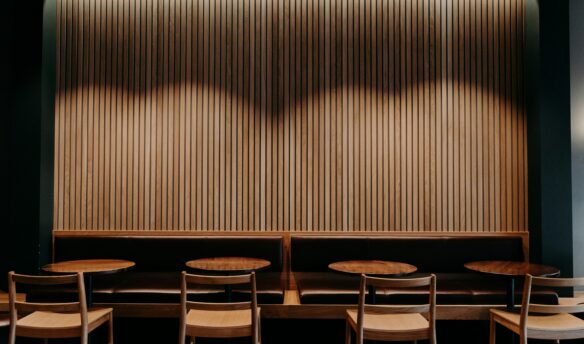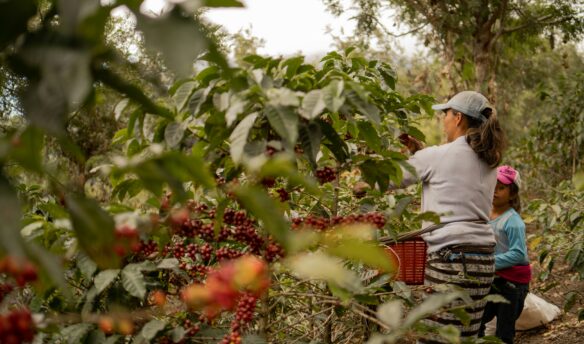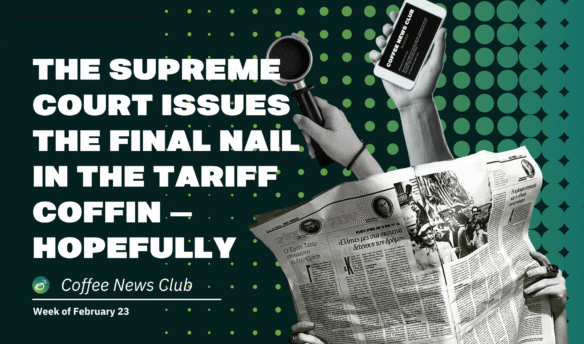Are oat milk surcharges discriminatory? A lawsuit filed against Dunkin’ thinks so. Plus, the most complete coffee genome sequencing yet, and an alternative to cold brew pasteurization.
‘All Arabica Coffee is Genetically Similar: How Can Beans Taste So Different? – via Nature
Scientists in Italy have completed “the most complete sequencing yet of the genome of Coffea arabica” and revealed more about the complexity—and lack of genetic diversity—within the most popular coffee species.
The research, published in Nature Communications and funded by illycaffè and Lavazza, used advanced technology that “can read DNA strands up to hundreds of thousands of base pairs in length without interruption and with greater accuracy than earlier technologies,” according to Nature.
Arabica, which comprises almost 60% of global coffee production, is a relatively young species, forming from a hybrid of Coffea canephora (robusta) and Coffea eugenioides within the last 50,000 years. Because of its genetic makeup—robusta has two copies of each chromosome, but arabica has multiple copies—it is more difficult for arabica to interbreed with other species.
Its genetic complexity means arabica must instead rely on mutations rather than crossbreeding, and thus, arabica is less genetically diverse than other coffee species. “From that single plant, which has basically no variation, you create the whole species, and then the variation that you have is only the novel mutations that have occurred since that event,” said Michele Morgante, a plant geneticist at the University of Udine and one of the authors of the study.
You might be reading this and think, if coffee is so genetically limited, why do coffee varieties from different growing regions taste so different? Why does the bourbon variety have different flavor notes and disease susceptibility to typica? That’s also something the scientists are exploring.
Using the next-generation technology, researchers are beginning to understand why particular varieties within the arabica species might express different characteristics, like flavor or viability within a specific growing region. According to their findings, differences are not necessarily correlated with individual genes but instead “seem to be mainly the result of wholesale swapping, deletion and rearrangement of chromosomes.”
Along with providing more answers about gene expression, more complete genome sequencing can help coffee breeders and farmers facing climate change-induced challenges. “Getting a proper in-depth understanding of the genome would basically help us to understand how the crop evolved and also understand the genomes of coffee in line with its parents,” Kassahun Tesfaye, a plant geneticist at the Institute of Biotechnology at Addis Ababa University, told Nature. “We need to equip breeders, mostly in the developing countries, with the toolkits to breed for low caffeine, to breed for specific disease [resistance], to breed for high productivity.”
‘Is That Extra Charge for Nondairy Milk Discrimination? A Lawsuit Challenges Dunkin’ Donuts’ Fees’ – via NBC News
Is it discriminatory for a cafe to charge extra for nondairy milk? A class-action lawsuit filed against Dunkin’ thinks so, accusing the corporation of violating the Americans with Disabilities Act (ADA) by forcing lactose-intolerant customers to pay extra for their drinks.
The lawsuit, filed in a district court in Northern California, says that plaintiffs have been charged between 50 cents and $2.15 extra by Dunkin’ for nondairy milk alternatives. “Being able to drink milk is a choice for some people, but it’s not for others. Lactose intolerance is a disability under the Americans with Disabilities Act, as amended,” Bogdan Enica, an attorney representing the plaintiffs, told NBC. Enica has previously sued Starbucks for similar discriminatory practices (the case is still ongoing).
Charging for nondairy milk alternatives raises the issue of dietary racism—lactose intolerance disproportionately affects people of color. The nonprofit Switch4Good has been advocating against nondairy surcharges for years: in 2021, they released a fake Starbucks press release claiming the company would stop its surcharge to “[reverse] years of dietary racism.” The press release fooled several national news outlets, and a month later, Starbucks announced it would remove its surcharge in the UK.
The lawsuit against Dunkin’, which seeks $5 million in damages for ten plaintiffs, revolves around the ADA’s requirement that public entities make “reasonable modifications” to their policies so that individuals with disabilities can access their goods or services. Professor Arlene Kanter, director of the Disability Law and Policy Program at Syracuse University, told NBC that the lawsuit makes a “strong case” for discrimination according to the ADA. “If a person qualifies as a person with a disability, and they’re entitled to an accommodation or modification—which in this case looks pretty simple as nondairy milk—they cannot be charged extra,” Kanter said.
More News
‘Here Is Everyone Moving On For the 2024 US Cup Tasters & Roasters Championship‘ – via Sprudge
‘Drive Research Confirms Taste is Tops for 83% of Consumers’ – via STiR Coffee & Tea
‘New Coffee Snake Species Discovered in Ecuador’s Cloud Forests’ – via Phys.org
‘First Virtual Specialty Coffee Auction for Brazil’s Cerrado Mineiro Region Unveiled’ – via World Coffee Portal
‘It’s Fine, A Robot Learned To Make Coffee By Watching Videos, Everything’s Fine‘ – via Sprudge
‘JDE Peet’s Will Take Over Caribou’s Coffee Roasting Operations’ – via Restaurant Business Online
‘Sumatra Coffee Farmers See Gains Through Agroforestry and Organic Fertilizer‘ – via Daily Coffee News
The Week in Coffee Unionizing
- The Service Employees International Union has filed a complaint with the US Department of Labor, asking it to investigate whether Starbucks illegally failed to report the extent and cost of its anti-union activity and relationship with the law firm Littler Mendelson. The union wants the DoL to demand financial disclosures from Starbucks detailing how much it is paying the “union-avoidance” law firm for its help fighting the nationwide unionization drive. A Bloomberg Law article from June 2023 detailed at least 110 Littler attorneys working on Starbucks’ behalf, including more than 50 partners.
- A National Labor Relations Board (NLRB) judge ruled that Starbucks broke labor law when it disciplined and eventually fired a barista at a location in Marysville, Washington. The ruling ordered the company to rehire the worker and give them a promotion they had been denied. “Violating the National Labor Relations Act has become standard operating procedure for Starbucks,” the judge wrote. Starbucks denies the allegation.
- Sixty baristas at an Ann Arbor, Michigan, mini-chain will vote on whether to join Teamsters Local 243. Workers at four Sweetwaters Coffee & Tea announced their intent to unionize in December 2023, seeking “a livable wage, better benefits, reliable scheduling, a democratic workplace, and more.” Sweetwaters ownership said they were “surprised by this turn of events,” with co-owner Lisa Bee telling the Michigan Advance that “while she understands the attraction to a union conceptually, she doesn’t believe one is necessary at her stores.”
- Two locations of Ultimo Coffee in Philadelphia have parted ways with their union after workers at each location filed decertification petitions. The Philadelphia Joint Board Workers United then filed “disclaimers of interest” before a vote could take place, ending union representation at both stores. Two Ultimo locations remain unionized and will continue with contract negotiations.
Is Coffee Good For You?
Cold brew is exceedingly popular, and its growth is only expected to increase. But with that growth comes growing pains. A significant hurdle for cold brew manufacturers is ensuring their product is safe to drink without compromising flavor.
One of the big bugbears with RTD canned coffee is the taste—at scale, current pasteurization techniques tend to flatten out and dull any brightness or complexity of flavor. However, according to a new study, high-pressure processing (HPP) could be a potential alternative sterilization technology for cold brew that both kills bacteria and maintains flavor quality. HPP is a food preservation technology that uses water to create extreme pressure for several minutes, inactivating pathogens and extending shelf life. It is already used for various other products, from juices and smoothies to meat and fish.
The study was conducted by Spanish HPP equipment manufacturer Hiperbaric in conjunction with the University of Burgos, and the findings were published in the journal Foods. It found that treating cold brew with HPP achieved “substantial reductions in pathogenic bacteria while maintaining the fresh flavor and quality that consumers desire in cold brew coffee,” according to a press release.
Researchers inoculated cold-brewed coffee with three foodborne pathogens—E. Coli, Listeria, and Salmonella—and then applied HPP processing at 6,000 bars of pressure for three minutes. The process achieved a greater than 6-log pathogen reduction below detection limits, which means a decrease of a particular microorganism population by six orders of magnitude or 99.9999%. According to Hiperbaric, this makes “HPP an effective kill step for enhancing safety of ready-to-drink cold brew coffee.”
The process also managed to retain the coffee’s taste. “Key attributes like color, bioactive compounds, dissolved solids, pH and antioxidant activity were unchanged by HPP and remained stable during more than three months refrigeration,” the press release states.
Beyond the Headlines
‘Regenerative Agriculture In Coffee: The Promise of True Sustainability’ by Juliana Ganan
‘How Unions are Fighting a Boardroom Battle at Starbucks’ by Ortenca Aliaj and Patrick Temple-West
‘The Sprudge Guide To Coffee Shops In Ho Chi Minh City, Vietnam’ by Tung Nguyen






